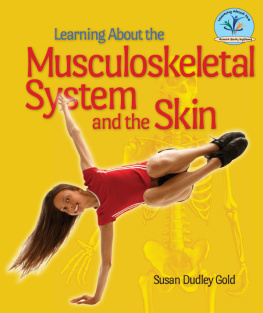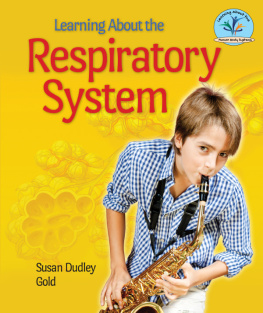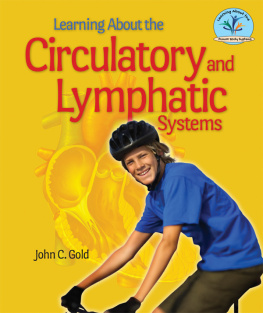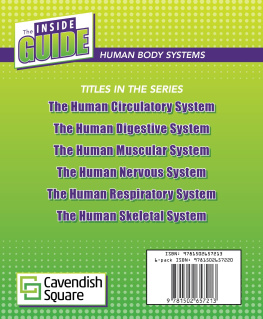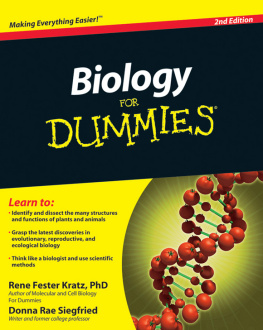Turning Food Into Fuel
The digestive system mashes, chops, crushes, dissolves, and breaks down the food we eat into molecules of nutrients. These provide energy to the rest of the body. Then the excretory system filters the blood and regulates the amount of salt and water in the body. Learn how these remarkable systems work together to bring us life-giving nutrients and rid our bodies of waste.
About the Author
Susan Dudley Gold has written more than two dozen childrens books, many of which focus on health issues. She has also written three books on the history of Maine.

Image Credit: Life Art, Williams & Wilkins
Marys mouth waters when she thinks of chocolate cheesecake. By 10 A.M. Bens stomach growls if he doesnt eat a snack.
We all need food. Food gives us energy. It provides the fuel our bodies need to perform the tasks that keep us alive. But our bodies cant use food until it is processedbroken down into tiny parts.
Putting gas into a car without an engine would be useless. Likewise, without a digestive system, we would starve to death even if we ate six meals a day. The digestive system dissolves the food we eat and extracts nutrients from it. The bloodstream then carries these nutrients, with their precious cargo of energy, to the rest of the body.
The human body depends on the digestive system for the energy necessary for life. From tiny cells to a thirty-foot tube to organs the size of a fist, each part of the system plays an important role in keeping us healthy.
Just one swallow of food sets the digestive system into action. Every bite we eat must be mashed, crushed, chopped into tiny pieces, turned to mush, and broken down into molecules before it can do us any good. Nutrients must be processed and stored. Water must be absorbed. Vitamins must be dissolved.
After a full meal, a person may doze. But the internal body does not rest. In fact, this is its busiest time. Food quickly enters the stomach after being chewed and softened by the teeth and the mouth. For the next twenty-four hours or so, the body will process the food, extract the nutrients, and expel the waste. The stomach works on the food, then passes it to the small intestines for further processing. Here the food finally becomes small enough for the body to absorb it.
The body must also get rid of waste products. The digestive system separates out wastes from food and expels them. Other wastes, the result of chemical reactions in the body, are disposed of through the excretory system. Chemical reactions allow us to breathe, bring water into our systems, and do many other activities that keep us alive. The excretory system gets rid of the waste products from each of these activities. Part of the excretory systems job is to regulate the amount of salt and water in the body. In addition, the system expels carbon dioxide, a waste gas exhaled through the lungs. The system also gets rid of waste materials that exit the body in the form of sweat.
When working well, the two systems are remarkably efficient. Very little is wasted. The kidneys filter about 200 quarts (190 liters) of liquid a day. Only about 2 quarts (1.9 liters) leave the body as urine. Feces is the solid waste eliminated during a bowel movement.
One little glitch in either system, however, can cause big problems. For example, diarrhea occurs when something irritates the intestines. This signals the system to empty the intestines. The food passes through too quickly to allow nutrients and water to be absorbed by the body. A person, especially a young child, can die from dehydrationlack of fluidsif diarrhea continues too long.

Image Credit: Shutterstock.com
The digestive system transforms the food we eat into energy our bodies can use.
The digestive and the excretory systems take the food we eat through a marvelous maze. By the time it reaches the mazes end, Bens mid-morning snack has given him the energy to chase a fly ball. Along the way, the systems have cleansed his blood and provided the nutrients necessary for life itself.
The digestive system and the excretory system work hand in hand to keep the body healthy, nourished, and cleansed. The two systems depend on many body parts to assist them. Organs such as the pancreas, the liver, and the gallbladder help out. Nerves, muscles, and hormones also get in on the act. This team performs the many complex tasks involved in digestion and excretion.
The digestive system runs an amazingly efficient food-processing plant. The system operates in the gastrointestinal or digestive tract. This long tube runs from the mouth to the anus. With its twists and turns, it extends about thirty feet (nine meters). Food travels through the digestive tract and is processed along the way. The tract includes the mouth, the esophagus, the stomach, the small and large intestines, and the anus. Other organs help in the food-processing work.
Along the walls of the digestive tract are layers of smooth muscle. A thick, moist membrane called the mucosa coats the inside of the tract. The mucosa has three sublayers and several tasks. It secretes mucus, a thick, slippery fluid that acts like oil in a machine to keep the entire system lubricated. It also releases enzymes and hormones that help digest the food we eat. An enzyme is a protein that speeds up chemical reactions. Hormones carry instructions from one part of the body to another. The mucosa also absorbs digested nutrients and returns them to the bloodstream.
Like an assembly line, the digestive tract has workers all along the way. From the moment food enters the mouth to the time waste leaves the body through the anus, these working body parts mash the food, grind it, soften it, dissolve it, and pass it along to the next workstation. Strong bands of muscle, called sphincters, separate the work stations. They operate like one-way doors that open only when pushed. These muscular valves help separate the parts of the digestive tract. This prevents harsh substances in one chamber from harming the next chamber in line.
The mouth has the equipment needed to mash and soften food. This gets that apple or that cheeseburger ready for the trek through the digestive tract. Three sets of glands in the mouth release a watery substance called saliva. This moistens the food and makes it easier to chew.
Teeth crush the food. Tough enamel coats these hard, rigid structures. Gums of soft tissue act as shock absorbers when the teeth bite and chew. The jawbone anchors the teeth and allows them to move up and down.
When we chop onions, we select a special knife designed for that chore. Another type of knife makes it easy to slice bread. Our teeth serve us in a similar way. We use our front teethsharp incisors shaped like chiselsto bite into an apple. If the steak is tough, pointed canines rip off a piece of the meat. Farther back in the mouth, premolars with two ridges crush the food into a mushy mass. The largest and strongest teeth, the molars in the back of the mouth, grind food into even smaller and finer bits.
The tongue moves food around in the mouth, pushing it between the teeth. The tongue has thousands of tiny bumps called papillae. Many of the papillae contain tiny taste buds that let us taste food. These taste buds send signals to the brain, which interprets the reports. Some taste buds detect sweet tastes, while others sense sour or bitter tastes.


